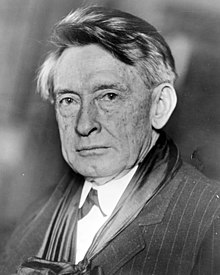Thomas E. Watson (politician)
Thomas Edward "Tom" Watson (born September 5, 1856 in Thomson , McDuffie County , Georgia , † September 26, 1922 in Washington, DC ) was an American politician of the Populist Party and the Democratic Party . From 1891 to 1893 he sat for the US state Georgia in the US House of Representatives . In 1904 and 1908 he was a candidate for the Populist Party in the US presidential election. He represented Georgia in the US Senate from 1921 until his death .
biography
Watson was born in Thomson, western Georgia. He attended Mercer University . Due to lack of money, he could not complete his studies and left the university after two years. He then worked as a teacher. He later studied law and was admitted to the bar in 1875. During this time he became a member of the Democratic Party. In 1882 he became a member of the Georgia House of Representatives . As a member of the legislature, Watson struggled unsuccessfully to curb the abuses of the powerful railroad companies. A law requiring railroads to pay taxes to counties was not passed after Senator Joseph E. Brown invited the Georgia Legislature to take a train trip to the Louisville Exposition in 1883. Disgusted by Brown and his bribes, Watson resigned before the end of his term and returned to his law firm. In 1888 he was a member of the Electoral College .
From then on, Watson supported the Farmers' Alliance . With their support, he was elected to the US House of Representatives in 1890. He started work in 1891. Watson left the Democratic Group and instead became a member of the Populist Party. Of the eight other parliamentary group members, Watson was unsuccessfully proposed for election as speaker of the United States House on the day of his conversion . He was one of the driving forces behind the founding of the Populist Party in his home state. The Populist Party advocated public ownership of railways, steamboat lines, and telephone and telegraph systems, so it was against any privatization. She also campaigned for free and unlimited silver coinage, the abolition of national banks, a system of progressive income tax and the direct election of United States senators. Watson was also a strong advocate for African Americans to vote.
Although Watson was a member of a minority faction, he was still very influential in the legislature, especially regarding the lands. The most important of these was a law that forced the post office to deliver letters to remote farms. The law passed in 1893 eliminated the need for farmers to collect their mail from distant post offices or to have a private company do it. Watson fought for re-election, but was defeated by James CC Black , leaving the House of Representatives in 1893. Then he worked again as a lawyer in his hometown. He also wrote articles for the Populist Party newspaper.
In the run-up to the presidential elections in 1896 , the top of the Populist Party took up talks with the Democratic candidate, William Jennings Bryan , because it was felt that there was no chance with your own candidate. Watson was to become Bryan's running mate , provided that they could work together. After the assembly of the Populist Party officially nominated Bryan as their candidate, he in turn appointed Arthur Sewall as his running mate . Bryan's move split the Populist Party into two camps: on the one hand, those who refused to support Bryan and, on the other, those who reluctantly campaigned for him. Watson's name stayed on the ballot as Bryan's Populist Party runner-up, while Sewall was listed as Bryan's Democratic runner-up. In the end, Watson received 217,000 votes, which was less than a quarter of what the previous vice-presidential candidate had received four years earlier. Watson's result was also the highest result any candidate of the Populist Party received until the party's decline.
As his personal wealth grew, Watson condemned socialism , which had drawn many converts from the ashes of populism. He became an opponent of the Catholics and pleaded for the reorganization of the Ku Klux Klan . In the presidential elections in 1904 and 1908 , Watson ran for the Populist Party, but was only able to collect marginal numbers of votes, except in his home state of Georgia, where he received 18% (1904) and 12% (1908) of the vote.
After the fall of the Populist Party, Watson worked for various newspapers as both a writer and a publisher. From March 4, 1921 until his death he was politically active again, this time as US Senator for the Democratic Party, to which he had returned. Watson died of a stroke on September 26, 1922 . Rebecca Ann Latimer Felton has been named his successor. She served 24 hours and was the first female member of the Senate.
Web links
- Thomas E. Watson (politician) in the Biographical Directory of the United States Congress (English)
- Thomas E. Watson in the database of Find a Grave (English)
| personal data | |
|---|---|
| SURNAME | Watson, Thomas E. |
| ALTERNATIVE NAMES | Watson, Thomas Edward (full name); Watson, Tom |
| BRIEF DESCRIPTION | American politician (Populist Party, later: Democratic Party) |
| DATE OF BIRTH | September 5, 1856 |
| PLACE OF BIRTH | Thomson , Georgia |
| DATE OF DEATH | September 26, 1922 |
| Place of death | Washington, DC |


